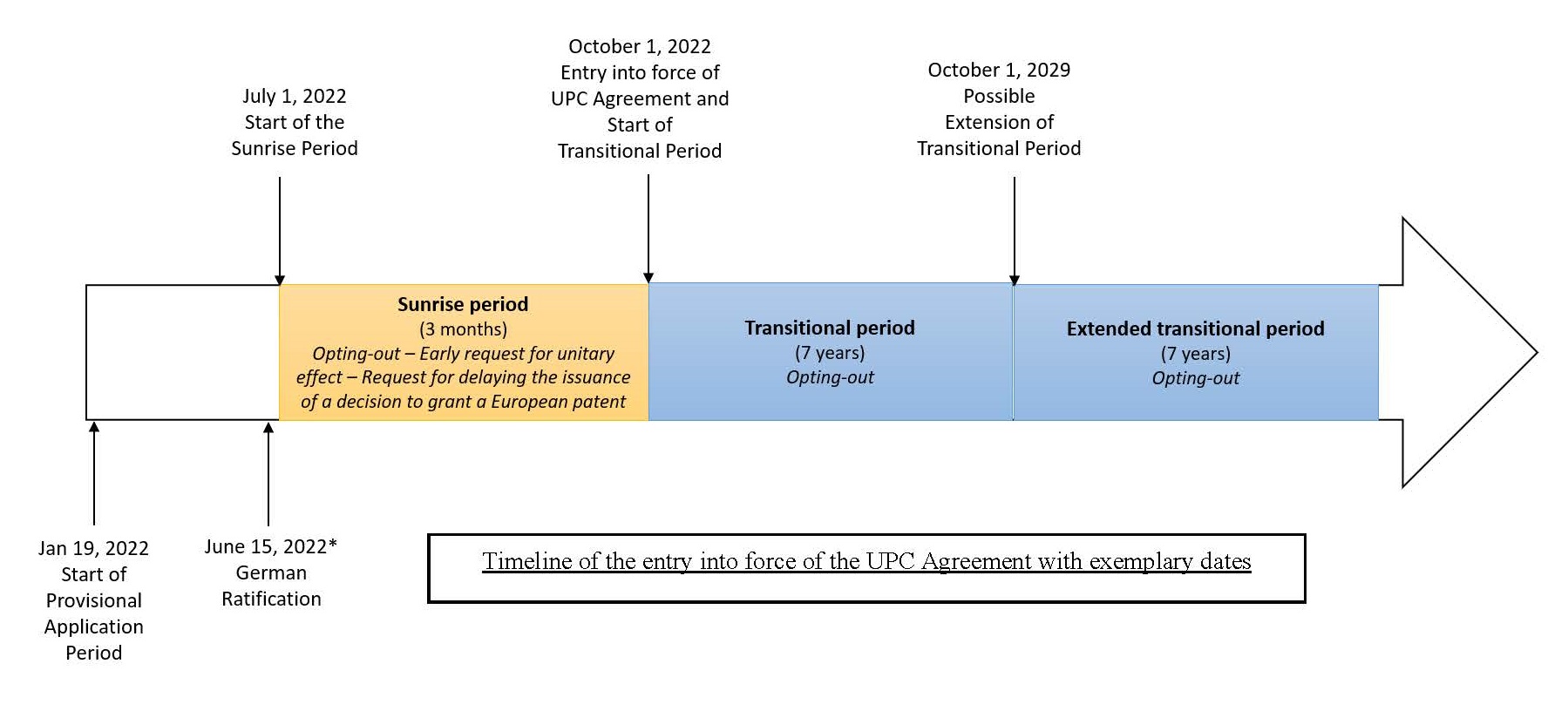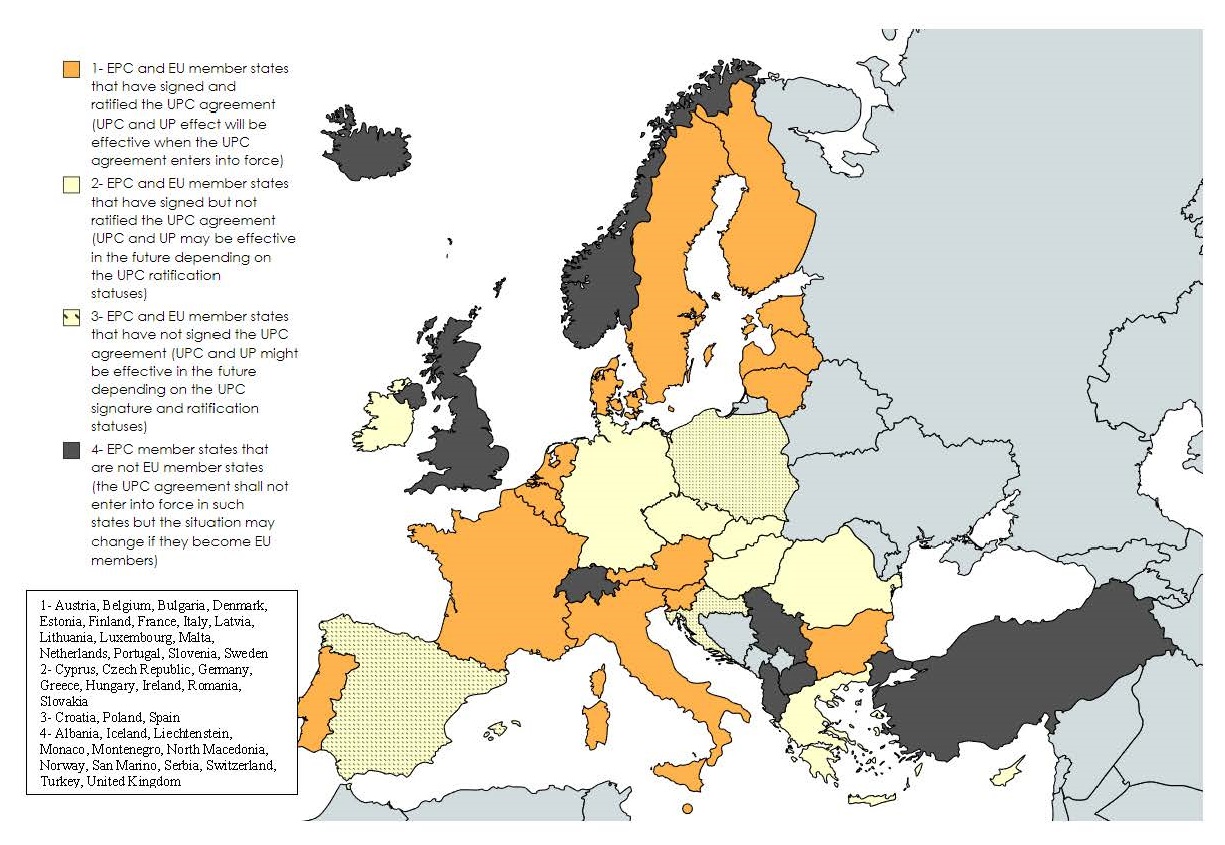Notice on The Upcoming Entry Into Force of The Unified Patent Court Agreement
Background: The Unified Patent Court (UPC) has been created with the aim of providing centralized, quick and efficient judicial procedures involving both European patents and European patents with unitary effect (“unitary patents”).
In contrast to European patents, unitary patents will not need any validation or administrative procedure in the countries covered by the UPC Agreement and will be litigated before the UPC only. According to a transitional arrangement applicable for at least six years, a single translation of the patent will be required. Thereafter, no translation will be required when opting for a unitary patent. Also, a single renewal fee will be due each year[1].
The Protocol to the UPC Agreement on provisional application entered into force on January 19, 2022, thus officially establishing the UPC as a legal entity. In the provisional application period, which is expected to last at least eight months, the UPC Preparatory Committee is entrusted to perform all preparations for opening the court. Germany, the last state required for the UPC Agreement to enter into force, intends to ratify the UPC Agreement when the preparations are sufficiently advanced or completed. At the earliest, the UPC Agreement could enter into force late 2022, but the actual date will be on the first day of the fourth month after Germany’s ratification of the Agreement, and all dates that follow will be based on this.

Options for Owners/Applicants of European patents/European patent applications
New possibilities arise for users before and as from the entry into force of the UPC Agreement.
In particular, before the entry into force of the UPC Agreement:
i. during a “sunrise period” of 3 months before the entry into force of the UPC Agreement, any European patent application/patent may be “opted-out” of the exclusive competence of the UPC, which could revoke such a patent across the whole UPC territory in a single action;
as of the date of deposit of Germany's instrument of ratification of the UPC Agreement:
ii. early requests for unitary effect will be allowed to be filed for European patent applications in which a communication under Rule 71(3) EPC (intention to grant) has been despatched. Upon a valid early request, the European Patentg Office (EPO) will register the unitary effect (and thus the European patent as unitary patent)after the publication of the mention of the grant of the relevant European patent following the entry into force of the UPC Agreement; and
iii. requests for delaying the issuance of a decision to grant a European patent will be allowed to be filed for any European patent application so that the mention of the grant is published in the European Patent Bulletin on or immediately after the date of entry into force of the UPC Agreement in order to allow the registration of unitary effect for that European patent.
As from the entry into force of the UPC Agreement:
iv. during a “transitional period” of at least seven years, which may be prolonged by up to a further seven years, any European patent application/patent may still be “opted-out” of the exclusive competence of the UPC provided no revocation proceedings have commenced before the UPC. After the transitional period, opting out will be no longer available. Withdrawal of opting out is possible, but is forbidden whenever national revocation proceedings are instituted against an opted-out patent;
v. every European patent granted on or after the entry into force of the UPC Agreement may be registered as unitary patent throughout the “participating states”, i.e., the member states of the European Union that have ratified the UPC Agreement, upon a valid request for unitary effect to be filed with the EPO within one month after grant; and
vi. validity and infringement ofboth unitary patents and classical European patents non-opted out from the exclusive comptence of the UPC will be decided by the UPC. In contrast, opted-out European patents can be individually litigated before national jurisdictions, as in the current European litigation system.
As can be seen from the map below, the initial participating states will be seventeen (i.e., group 1 and Germany). However, the list of participating states will evolve over the coming years because all states party of the European Union having signed the UPC Agreement may ratify the UPC Agreement and thus become participating states. Importantly, the territorial scope after the registration of a European patent as unitary patent cannot be changed: this scope is determined by the number of states having ratified the UPC Agreement at the time at which the request for unitary effect is presented.
In non-participating states, a separate validation of the European patent will still be required in order to obtain protection in those states.
As soon as appropriate, we will be asking for instructions as to the following:
- OPTING-OUT, or
- OBTAINING UNITARY EFFECT.
Should you have already identified the files to be opted out and those for which you are potentially interested in obtaining unitary effect, please let us know at your earliest convenience.
We will be also asking for instructions as to Filing an early request for unitary effect and for Filing a request for delaying a decision to grant.

[1] The renewal fee of a unitary patent will be slightly lower than the sum of the renewal fees of a classical European patent validated in 4 states.
(*) As noted, the UPC Agreement will enter in force on the first day of the fourth month after Germany’s ratification of the Agreement. To help readers understand the available options as well as their possible timing, we have assumed June 2022 as the earliest hypothetical ratification date. By way of example, if Germany deposits the instrument of ratification of the UPC Agreement on June 15, 2022, the UPC Agreement will enter into force on October 1, 2022, as indicated in the illustrative timeline.




